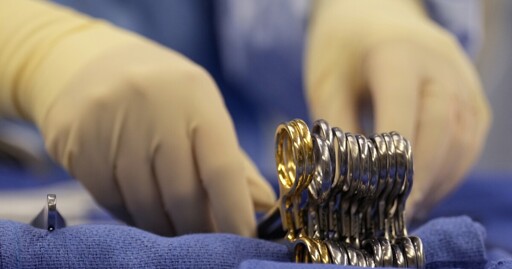TJ Hoover was declared brain dead after suffering an overdose in October 2021, but his sister Donna Rhorer says doctors attempted to harvest his organs while he was still showing signs of life.
Rhorer says TJ’s eyes were open and tracking movement during his honor walk, when family members gather to say goodbye before organ donation surgery.
“Almost immediately as soon as his honor walk started, his eyes were opened, and they were tracking, looking around at the people that were there,” Rhorer said.



Can you talk about the two surgeries you have been a part of? Also, I never thought about that: they give the dead patients anesthesiology? Why?
Sure!
Anesthesiologists are known primarily for preventing sensation and awareness, but they manage pretty much all of your body’s functions including things like respiration and blood pressure. The conversation about the degree of intervention needed for an organ donor is riddled with an absolute fuckton of conjecture, so if you want to go down that rabbit hole, be mindful of whether or not you’re reading a credible source.
Studies in the National Library of Medicine are my personal go-to: here’s a good one on this topic: https://pmc.ncbi.nlm.nih.gov/articles/PMC10355135/ (Crtl+F “Preoperative Role of the Anesthesiologist for Organ Procurement After Brain Death” to jump to the bit that specifically addresses your question).
Reading that, it sounds like anesthesiologists are the primary authority on verifying the legal checkmarks for verification of brain or cardiac death, and ultimately giving the thumbs up or down for the surgery to proceed. I didn’t know this - my assumption was that it was the primary care doc’s responsibility… so my initial post here probably should have chewed out the anesthesiologist too.
The ones I was in… so I’m a surgical technologist - recently posted a breakdown of my job here. Both of them were brain death due to drug overdose. Organ harvests vary a lot depending on which organs are actually being harvested. The first one I was in was after the pancreas, liver, kidneys, lungs, and heart, so as the tech I had to set up for and do 5 different surgeries at the same time. Each organ system had its own surgeon come in from the donor organization (both of mine were under Life Share). All of them want to move fast to keep the organ tissue as healthy as possible so it stays viable for the recipient, so I felt like the octopus dude from Spiderman madly passing and receiving a slurry of scalpels, hemostats, scissors, and ties. We had 4 ‘slushers’ running to produce sterile ice which we poured a lot into the abdominal and thoracic cavities; and more into basins for the organs to be placed in once they were removed.
As each doc finished, they broke scrub and left immediately with the organ, which was transported straight to the recipient site at some other hospital (iirc the heart was transported by helicopter), so it went from being absolute madness to a kind of eerie stillness. Seeing the donor on the OR bed with the cavities fully exposed and completely empty was pretty unnerving. We did a final sponge/sharps/instrument count (which is done in every surgery to ensure nothing gets left in the wound [every policy has a terrifying backstory]). Sutured the incisions closed, but with much larger ‘bites’ than normal and all with one running stitch (vs an ‘interrupted’ stitch where each one has its own length of suture). I think from the OR, the body goes to mortuary or something for postmortem care to make it look as presentable as possible for a funeral - so that stitch is probably removed, and the cavities packed with something to fill in the empty space, but I’m not involved in that part of it, so, speculating on that last bit.
Second one was mostly the same, except they only took the pancreas, kidneys, and liver - other organs were deemed nonviable for whatever reason.
In both of them, we were present for the honor walk, and they told us a bit about the patient. The OR side of things is a mad dash for tissue preservation sake, but the process as a whole was very sensitive to the human side of things. One of the cool things they did in both was asked the family what kind of music the patient liked, and they played it over the OR room speakers through the entire operation. We also got to meet the family, which is about the only time a surg tech ever gets to do that. Typically we’re in the actual OR all day - before the case when the doc is talking to you, we’re in the room setting up the instruments and such; and afterward we’re still in the room tearing down and setting up for the next one. The organ harvests were much more personal.
Happy to answer any questions, but keep in mind as the tech I’m the literal rock-bottom of the OR food chain, so some of my answers might be “No idea!” followed by speculation.
That was an awesome read, thank you!
Probably to suppress involuntary reflexes, I’m not a doctor